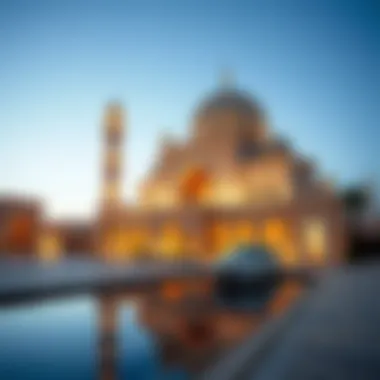Official Holidays in the UAE: A Detailed Exploration


Intro
The United Arab Emirates (UAE) stands as a melting pot of traditions and modernity, offering a unique blend of ancient customs alongside its rapid advancement. The significance of official holidays in this nation goes beyond mere days off from work. These occasions reflect the UAE’s rich cultural tapestry and provide an opportunity for citizens and expatriates alike to partake in longstanding traditions.
From the joyful celebrations of Eid al-Fitr, marking the end of Ramadan, to the solemn reflections of UAE National Day on December 2nd, each holiday carries meaningful historical importance. Furthermore, public holidays in the UAE significantly influence various sectors, including tourism, retail, and real estate. Understanding the dynamics of these holidays can provide valuable insights for investors, business owners, and community members.
This exploration aims to delve into the various official holidays observed in the UAE, unearthing their cultural roots, regional variations, and their implications for local and expatriate life. Additionally, we will assess how these holidays shape economic trends, particularly in the real estate market, highlighting data-driven insights that could prove beneficial for agencies, buyers, and developers navigating this vibrant landscape.
With that said, let’s jump into the exploration of the market trends surrounding holidays in the UAE.
Prelude to Official Holidays in the UAE
Official holidays in the United Arab Emirates hold significant weight within the fabric of society, reflecting the country's unique blend of tradition and modernity. These holidays are not just days off but are imbued with cultural, religious, and social meanings that resonate deeply with both the local population and expatriates. Understanding this intricate web of official holidays is essential for anyone looking to engage with the UAE, be it investors, buyers, agents, or developers.
Understanding the Concept of Official Holidays
Official holidays are designated days recognized by the government during which workers, schools, and businesses often close or operate under reduced hours. This concept serves as a means to promote national unity and cultural awareness. Official holidays in the UAE are rooted primarily in Islamic traditions, yet they also celebrate pivotal moments in the nation's history.
In terms of their relevance, these days serve not only as a break from routine but are opportunities for families to come together, share experiences, and participate in communal activities. The communal aspect is particularly important given the multicultural demographic of the UAE, which accommodates a myriad of religions and cultures.
In the spirit of inclusivity, understanding these holidays helps expatriates adapt better to their new environment. It fosters respect for local customs, which can in turn lead to a more harmonious living experience.
Historical Context of Holidays in the UAE
Diving into the historical background, the concept of holidays in the UAE has evolved drastically over the years. Initially, the UAE's holidays were mainly based on Islamic observances, such as the observance of Eid Al-Fitr and Eid Al-Adha, which commemorate significant events in the Islamic calendar. These holidays are times of great reflection, generosity, and community gathering, and they have roots that trace back to the early days of Islam.
Moreover, national holidays like UAE National Day, celebrated on December 2nd, mark the unification of the seven emirates in 1971, reflecting not just a political milestone but a moment of cultural and social pride. Commemoration Day also fits into this historical narrative, honoring those who sacrificed in the service of their nation, which adds a layer of respect and gratitude to the holiday calendar.
"Understanding the historical significance of holidays in the UAE is pivotal for grasping the overall culture and social dynamics of the country."
Through a closer examination of these contexts, one can see how these official holidays play a crucial part in constructing a collective identity among the people, revered and celebrated across diverse emirates. This historical narrative makes the UAE's holiday calendar not just a schedule of time off, but a tapestry of rich stories and experiences that shape the modern nation.
Types of Official Holidays
Understanding the types of official holidays in the UAE is like peeling back layers of a rich and diverse cultural tapestry. Each holiday reflects the profound values and traditions of the Emirati people, while also significantly impacting various sectors like tourism and real estate. Recognizing both Islamic and national holidays reveals insights into the nation’s identity and societal frameworks.
Islamic Holidays
Eid Al-Fitr
Eid Al-Fitr marks the end of Ramadan, the holy month of fasting. This holiday is not only a religious observance but also a time for reflection, community bonding, and charity. Families come together to share meals, exchange gifts, and engage in acts of kindness, which is a key aspect of the holiday's appeal.
A significant characteristic of Eid Al-Fitr is the communal prayer held in mosques and open areas, bringing together individuals from all walks of life.
“It’s when you really see the spirit of togetherness and giving come alive.”
The festive atmosphere is pervasive, with public celebrations often featuring fireworks and cultural performances. One unique aspect is the giving of Zakat al-Fitr, which underscores the importance of charity, encouraging even greater community involvement. What makes this holiday popular in this article is its embodiment of collective joy and social responsibility.
Eid Al-Adha
Eid Al-Adha, known as the Feast of Sacrifice, stems from the story of Prophet Ibrahim's devotion and is observed with significant ritual and symbolism. This holiday emphasizes sacrifice, community, and thanksgiving to Allah.
Families typically engage in the ritual sacrifice of animals, such as sheep or goats, and share the meat with friends, family, and those in need, reinforcing communal ties. The public visibility of these practices showcases the culture's commitment to charitable actions.


Eid Al-Adha also provides opportunities for larger gatherings, educational programs, and local fairs. Its unique features support economic activities, making it attractive for tourism and enhancing local businesses. The holiday's complete focus on community engagement embodies the essence of UAE’s shared values.
Islamic New Year
The Islamic New Year, marking the start of Muharram, is a time for self-reflection and cultural observance. Although not celebrated with grand festivities, it holds significance in understanding the lunar calendar and the passage of time in Islamic teachings.
A key characteristic is its role in reminding people of their faith and their purpose. While it lacks the vivid celebrations of Eid, the observance prompts families to come together and reflect on the past Islamic year’s achievements and challenges.
This low-key observance offers a unique advantage as it fosters personal growth while still promoting cultural insights into Islam. In this article, its understated nature plays a critical role in highlighting the varying depths of holiday celebrations.
Prophet Muhammad's Birthday
Celebrating Prophet Muhammad's Birthday, or Mawlid al-Nabi, is a day marked by reverence and reflection. It's a time to honor the life and teachings of the Prophet, encouraging discussions on morality, kindness, and learning.
This holiday is particularly significant as it imparts lessons reflecting on the Prophet’s life. The unique feature of this day involves communal prayers, lectures, and sharing of traditional sweets, which fosters a sense of unity and devotion among the community.
In the context of this article, the cultural respect and emphasis on learning during Mawlid al-Nabi underscore the religious fabric of UAE society. Its distinct offerings provide a rich platform for understanding religious values in everyday life.
National Holidays
UAE National Day
UAE National Day is the crown jewel of the country's official holidays, celebrating the federation's formation in 1971. This day is vibrant, with parades, fireworks, and nationwide events showcasing patriotism and community spirit. A hallmark of National Day is the display of traditional Emirati culture, including dances, songs, and art.
The importance of National Day lies in its ability to foster national unity and pride among residents and citizens alike. As families get together to celebrate, it boosts local tourism with attractions hosting special events; hotels and restaurants often create unique packages attracting various visitors.
A distinctive feature of this holiday is how it transforms the landscape with decorations and celebrations, enhancing both community engagement and economic activity. By engaging with this holiday in this article, we emphasize its role in shaping collective identity and social cohesion.
Commemoration Day
Commemoration Day, observed on December 1st, is a solemn yet significant occasion that honors those who have served the nation and made the ultimate sacrifice. This day instills a sense of responsibility and respect for the heritage of the UAE.
What sets Commemoration Day apart is the national mourning period observed, emphasizing respect and gratitude for the sacrifices made for the country’s liberty. The day’s commemorative activities help reinforce national pride and resilience in the face of challenges.
In the context of this article, the inclusion of Commemoration Day showcases the multifaceted nature of official holidays, wherein celebrations of joy interweave with solemn remembrance. The balance of festivity and reflection within the UAE's holiday framework is integral to understanding the nation's sociocultural dynamics.
Cultural Significance of Holidays
Taking a closer look at the cultural significance of holidays in the UAE reveals layers that go far beyond mere days off work. These celebrations resonate deeply within the fabric of Emirati society, fostering community spirit, preserving traditions, and shaping national identity. In a country as diverse as the UAE, where a mosaic of cultures coexist, holidays provide a unique lens through which to understand the intersection of tradition and modernity.
One cannot overlook how holidays serve as a bridge connecting different segments of society—from locals to expatriates. They promote intercultural exchange and understanding, enriching the collective experience of those living in the UAE. Each holiday, with its specific rituals and customs, is not just a time for relaxation but also an opportunity to engage in cultural dialogues that enhance social cohesion. In essence, these holidays symbolize unity in diversity, allowing everyone from various backgrounds to connect over shared celebrations.
Traditions and Rituals
The traditions and rituals tied to holidays in the UAE are steeped in rich history and meaning. Take Eid Al-Fitr, for instance; it’s not merely about breaking the fast but also about sharing joy with family and friends. Known for family feasts, the holiday sees the exchange of gifts and sweets, with maamoul cookies being a favorite. Another remarkable custom is performing acts of charity, reflecting the spirit of giving that is intrinsic to these celebrations.
Moreover, Eid Al-Adha, which commemorates the willingness of Ibrahim to sacrifice his son, involves a unique ritual of animal sacrifice. This act is not just about fulfilling religious obligations, but also about providing for others, as the meat is often distributed among those in need. This reinforces societal bonds and illustrates the region's commitment to generosity and compassion.
During these holidays, local markets and public spaces buzz with activities. Traditional dances, music, and food stalls create an ambiance that echoes the values and stories of the emirate’s rich cultural heritage. The ways in which families and communities gather to participate in these festivities not only showcase age-old customs but also reflect the adaptability of tradition to contemporary life.
Impact on Community Relations
Holiday observances foster community relations in multiple ways. The emphasis on togetherness during celebrations leads to closer ties among various community segments. For many expatriates, these festive occasions create opportunities to engage with local citizens, promoting understanding and acceptance across cultures.
In urban areas like Dubai, the grand celebrations often see large gatherings in public places, with fireworks, parades, and cultural exhibitions. These events welcome everyone, regardless of nationality or background, allowing individuals to partake in the joyous atmosphere. It's not uncommon to find expatriates embracing local customs during these times, participating in rituals such as henna painting or festive prayers, which serves to deepen their connection to the UAE.


On the flip side, the challenges associated with differing levels of observance often arise. Balancing personal, cultural, and religious expectations can sometimes create friction within communities. Some expatriates might feel out of place in traditional festivities, particularly due to language barriers or different customs. However, such challenges can often lead to valuable conversations and broadened perspectives, ultimately enriching the tapestry of community life.
Understanding these dynamics is crucial for investors, developers, and newcomers in the UAE. Recognizing the importance of inclusivity during holidays can open doors for broader engagement, creating avenues for business opportunities that resonate with both local and expatriate populations. This intercultural understanding also plays a significant role in shaping community-oriented commercial spaces during holiday seasons.
"Holidays in the UAE are not just time off; they are a celebration of our stories and shared dreams."
Observance Across Emirates
The celebration of official holidays in the UAE showcases a rich mosaic of traditions that reflect the diverse culture of the Federation. Understanding the variations in observance across different emirates is crucial for both locals and expatriates. Each emirate has its distinct flavor, which shapes the way public holidays are recognized, celebrated, and enjoyed.
The significance of these holidays isn't just in interrupting the daily grind, but in fostering a sense of community and belonging. They often provide a platform for cultural exchange, allowing people from different backgrounds to come together and appreciate the UAE’s heritage. This tapestry of cultural celebration strengthens social ties and enhances understanding among the diverse population residing in the UAE. Ultimately, exploring these differences helps to paint a comprehensive picture of life in the Emirates.
Differences in Observance
Dubai
Dubai stands prominently as a cosmopolitan hub, marked by its vibrant mix of cultures. The city is renowned for its grand public displays during holidays, such as dazzling fireworks and impressive parades. Eid celebrations here are particularly bustling, with countless events catering to families and tourists alike, underscoring its status as a global city.
The key characteristic of Dubai's observance lies in its openness to international influences. The emirate often aligns its celebrations with global trends, making it a beneficial choice for expatriates who might be seeking familiar traditional practices. The unique feature of Dubai includes extravagant events, such as beachfront fireworks, which attract visitors from across the globe. However, this internationalism can sometimes overshadow local traditions, leading to a dilution of cultural practices in favor of global spectacle.
Abu Dhabi
Abu Dhabi, being the capital, has a slightly more traditional approach to holidays, exemplifying a blend of heritage and modernity. The government-organized events during holidays emphasize cultural authenticity. While Dubai might dazzle with its modern attractions, Abu Dhabi opts for events steeped in history and tradition, like the markets (souks) set up during Eid.
The key characteristic of Abu Dhabi's holiday observances is this strong emphasis on Emirati heritage. It serves as a popular choice for those who genuinely wish to engage with the roots of the UAE culture. A unique feature of Abu Dhabi is its serene atmosphere during holidays, which allows for family-oriented celebrations. Although quieter than Dubai, this approach can be perceived as limiting for those who prefer high-energy festivities.
Sharjah
Sharjah distinguishes itself as a cultural capital, with holidays deeply tied to art and tradition. The emirate is known for hosting cultural festivals and exhibitions during significant holidays. Sharjah's observance encourages families to engage in activities that enrich their cultural knowledge, making it a beneficial aspect for residents who wish to maintain a connection with their roots.
A unique feature here is the inclusion of various art showcases, poetry readings, and workshops during holidays. However, the focus on cultural enrichment means that local residents might find fewer large-scale entertainment options compared to Dubai or Abu Dhabi, leading to a challenge in attracting younger crowds looking for more vibrant antics.
Other Emirates
When considering other emirates like Ajman, Fujairah, Ras Al Khaimah, and Umm Al-Quwain, the holiday observance takes on more localized traditions. Each of these emirates tends to reflect its unique customs, which may not be as globally recognized but hold significant value for the local populace. Public events might be less grand but exude an intimate charm that fosters community bonding.
The key characteristic of other Emirates is the strong connection to local customs and traditions. Here, communities often engage in family gatherings, traditional food sharing, and localized festivities that celebrate their own heritage. A unique feature might include traditional performances or local artisan markets that never fail to attract residents during holiday periods. However, the challenge might lie in the limited resources and exposure compared to larger emirates, which sometimes can inhibit the broad scope of celebrations witnessed elsewhere.
"The beauty of the UAE's holidays is the way they blend the modern with the traditional, creating a unique tapestry of observance that resonates with all."
Socio-Economic Implications of Holidays
In the United Arab Emirates, holidays do not merely serve as a time for leisure and festivities; they represent significant socio-economic implications that influence various facets of life in the nation. Understanding these implications can provide valuable insights for investors, real estate developers, and expatriates, enabling them to navigate the local market and communities effectively.
Impact on the Real Estate Market
The holiday season in the UAE acts as a catalyst for the real estate market. This is especially prominent during major events like Eid Al-Fitr and Eid Al-Adha. During these times, a surge in consumer confidence often leads to increased investment in property. Many expats and expatriates choose to secure their homes ahead of the holidays, resulting in a notable uptick in rental demand and sales volume.
Moreover, developers strategically time their property launches around these holidays, aiming to capture the influx of potential buyers who are in a festive mood and may feel more inclined to invest.
Some key factors that illustrate the connection between holidays and the real estate sector include:
- Increased Rental Demand: As families gather during holidays, many prefer larger accommodations for celebrations, temporarily boosting demand in certain neighborhoods.
- Promotional Activities: Real estate agencies often roll out special offers and marketing campaigns around holidays, which can boost visibility and sales.
- Community Engagement: Developers hosting events during holidays strengthen community ties, fostering goodwill and leading to lasting relationships that can influence future property decisions.


Thus, it is evident that holidays can substantially shape the dynamics of the real estate market in the UAE, providing ripe opportunities for astute investors who can leverage these seasonal trends.
Tourism Boost During Holidays
The holidays in the UAE serve as a beacon for tourism, drawing millions of visitors seeking to immerse themselves in the authentic cultural experiences offered. During key holidays, the country experiences a remarkable swell in both international and local tourists. For instance, cities like Dubai and Abu Dhabi become hotspots of vibrant festivities, complete with fireworks, concerts, and cultural events that attract attention both regionally and globally.
The tourism impact can be broken down into several elements:
- Cultural Events and Festivals: The UAE organizes numerous events around public holidays. These may include traditional markets, art displays, and family-oriented events. Examples such as the Dubai Shopping Festival can see a significant uptick in tourist interest during the holiday seasons.
- Hospitality Sector Growth: Hotels and restaurants often report higher occupancy rates during holidays, contributing to economic growth. Local businesses thrive due to increased foot traffic during this time.
- Cultural Exchange and Learning: Tourists visiting during holidays gain insights into Emirati culture and traditions, enhancing the country’s goodwill and promoting a positive image abroad.
- Spending Patterns: Tourists are generally willing to spend more during festive seasons as they seek unique experiences and gifts.
"The festival atmosphere during holidays enhances the UAE’s allure as a travel destination, making it essential for local businesses and investors alike to recognize these shifts."
In sum, the socio-economic implications of holidays in the UAE reveal a complex interplay of growth in tourism and real estate. This environment presents unique opportunities for engaging with local culture while capitalizing on market dynamics, making it vital for diverse stakeholders to comprehend the underlying trends that holidays bring.
Challenges in Holiday Celebrations
When we talk about holidays in the UAE, we often envision vibrant celebrations, cultural expressions, and the togetherness of communities. However, lurking beneath this colorful facade are challenges that impact how these holidays are experienced across different sectors. Understanding these challenges is critical, especially for those looking to navigate the social and economic landscape of the UAE.
Contrasting observance between the public and private sectors, and the delicate dance between maintaining tradition while embracing modernity, are key topics that require examination.
Public vs. Private Sector Observance
One of the notable challenges in holiday celebrations within the UAE revolves around differing observances in the public and private sectors. In government entities, holiday schedules are typically consistent and aligned with the official announcements from the relevant authorities. For instance, employees in public sectors often enjoy extended leaves during major holidays like Eid Al-Fitr and the UAE National Day.
Conversely, within the private sector, things can get a bit murky. Companies have autonomy to determine their own holiday schedules, which can lead to a spectrum of observance that varies significantly from one organization to another. Employees might find themselves working on days when their public sector counterparts are off, creating a sense of inequality and sometimes frustration.
This discrepancy becomes particularly challenging for foreign workers who may not be accustomed to these variations in holiday observance. It can impact their cultural immersion and sense of belonging. In an environment where the workforce is largely expatriate, this imbalance introduces complexities in community cohesion.
Balancing Tradition and Modernity
Another pressing challenge lies in balancing tradition with modernity. The UAE is a country that effortlessly blends the ancient with the avant-garde. While traditional holidays often stem from deep-seated cultural roots, the rapid pace of modernization introduces a set of expectations that can conflict with these customs.
For instance, younger generations might prefer celebrating holidays with contemporary flair—think fireworks displays and grand concerts—rather than strictly adhering to traditional rituals. This divergence can lead to a generational gap in how holidays are perceived and celebrated.
Moreover, the influx of global cultures adds another layer of complexity. In a highly cosmopolitan society, there’s a fine line between honoring local traditions and accommodating the diverse preferences of expatriates who celebrate their own holidays and festivals. While this melting pot can foster enrichment, it also poses the risk of diluting native customs and causing friction among different communities.
"Understanding the balance between tradition and modernity is key to fostering amicable relationships during holiday celebrations in the UAE."
Addressing these challenges takes concerted effort from both government entities and private organizations. By striving for clearer communication and inclusive policies that honor both the rich traditions and modern sensibilities, the UAE can better navigate the complexities surrounding holiday celebrations.
Ending and Future Outlook
As we reach the end of our detailed exploration into the official holidays of the UAE, it's essential to reflect on how these celebrations shape the social landscape of this dynamic country. These holidays are not simply days off from work; they serve as vibrant reminders of the UAE’s rich history and cultural diversity. The connection between tradition and the modern global environment is particularly noteworthy, as it highlights the balancing act that the UAE performs in its quest for progress while honoring its roots.
Evolving Nature of Holidays
The holidays in the UAE are in a constant state of evolution, reflecting both regional influences and shifting demographics. For instance, as the expatriate population continues to grow, there's an increasing blend of various cultural practices and celebrations. Traditional Emirati holidays such as Eid Al-Fitr and National Day coexist with global observances like New Year’s Eve, illustrating a unique calendar that appeals to both locals and expatriates.
This ongoing transformation can lead to a refreshing exchange of ideas and celebrations. More recently, we have observed state-supported events that embrace art, music, and theater during holidays, enhancing the cultural relevance of these periods. Such initiatives not only aim at boosting the economic benefits through tourism but also strive to create a cohesive community, where everyone, regardless of origin, feels included in the festivities.
Furthermore, the impact of technology on holiday observance cannot be overlooked. Social media platforms like Facebook and Instagram have revolutionized the way people share and experience these celebrations, opening doors for new forms of engagement and interaction. However, amidst this advancement, there are concerns about how modernization might dilute the essence of traditional celebrations.
"Understanding how holidays evolve is vital in navigating personal and professional spaces in the UAE, for it shapes not just societal dynamics but also economic activities."
Importance of Understanding Holidays for Expats
For expatriates residing in the UAE, understanding the significance of official holidays is paramount. These occasions are often windows into the local culture, customs, and values. A newcomer who grasp the spirit of celebrations such as Eid Al-Adha or even Commemoration Day is better poised to build relationships with local colleagues and neighbors.
Being aware of the specific practices and nuances during these holidays can also aid expatriates in avoiding cultural missteps. For example, understanding why certain businesses may close during holidays or how to properly extend festive wishes can foster goodwill and mutual respect.
Moreover, for expatriates who are considering investing in real estate or starting a business in the UAE, recognizing the peak times during holidays can facilitate better decision-making. The increased tourism and heightened community activity can present unique business opportunities or incentive to understand the local market better, particularly in the lead-up to major holidays.







